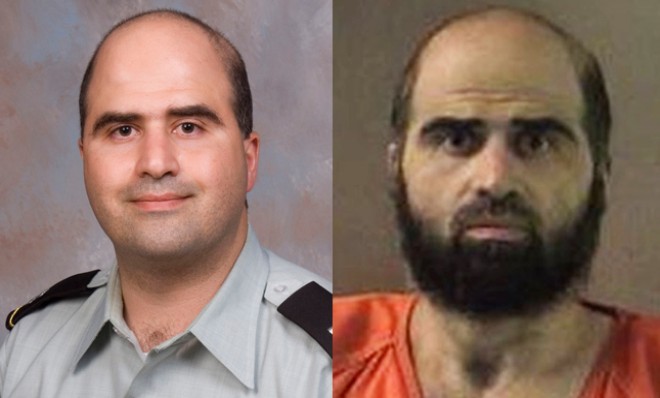Nidal Hasan, and the 5 other men on the military's death row
The Fort Hood shooter is eager to follow his path to martyrdom. He's going to have to get in line.

A free daily email with the biggest news stories of the day – and the best features from TheWeek.com
You are now subscribed
Your newsletter sign-up was successful
A military jury took just two hours on Wednesday to unanimously sentence Maj. Nidal Hasan to death for carrying out the worst mass shooting at a U.S. military base in the nation's history. Hasan, who killed 13 people and wounded 32 others during his 2009 rampage at Fort Hood, had insisted on representing himself — and hadn't exactly put up much of a fight, declaring on the first day of the trial that "the evidence will clearly show that I am the shooter."
If the Virginia-born Muslim was looking for martyrdom — as many, including his former defense team, claim — then he apparently got his wish. But he'll have a wait on his hands: As Bill Mears notes at CNN, "If swift justice is the goal, history may not be on Hasan's or the government's side." The military justice system requires a lengthy appeals process, whether Hasan likes it or not. Even if Hasan ignores many of the appeal options available to him, there are still mandatory processes in place running all the way up to the Supreme Court, which gets the final say on the matter.
Largely because of the time-consuming nature of this complex system, the last military execution was all the way back in 1961, when Army Pvt. John A. Bennett was hanged for the rape and attempted murder of an 11-year-old Austrian girl.
The Week
Escape your echo chamber. Get the facts behind the news, plus analysis from multiple perspectives.

Sign up for The Week's Free Newsletters
From our morning news briefing to a weekly Good News Newsletter, get the best of The Week delivered directly to your inbox.
From our morning news briefing to a weekly Good News Newsletter, get the best of The Week delivered directly to your inbox.
So for the foreseeable future, Hasan's going to have to wait it out at Fort Leavenworth, Kan., where the former Army psychiatrist won't be the only man languishing on military death row. These five soldiers are also awaiting execution:
Former Pvt. Ronald Gray
The longest serving inmate on the military green mile, Gray was sentenced to death in 1988 for two murders, an attempted murder, and three rapes in the Fayetteville, N.C., area while stationed at Fort Bragg. Though President George W. Bush approved his execution in 2008 (a soldier can't be executed without the approval of the president), Gray was granted a stay by a U.S. district court in the same year.
Former Army Pfc. Dwight J. Loving
A free daily email with the biggest news stories of the day – and the best features from TheWeek.com
Convicted in 1989, Loving was sent to death row after robbing and murdering two taxi drivers — one a retired non-commissioned officer, the other a soldier moonlighting as a driver to earn some extra cash. With his execution planned for 1992, Loving was expected to be the first soldier to be put to death in decades. Two decades later, he is still awaiting a final decision.
Former Army Sgt. Hasan Akbar
Akbar was handed the death penalty after killing two soldiers and wounding 14 others in a chaotic grenade and rifle attack at Camp Pennsylvania in Kuwait in 2003, just two days after the United States invaded Iraq. Akbar threw four hand grenades into the tents where soldiers were sleeping, before opening fire on other soldiers, in an attack which prosecutors said was designed to achieve "maximum carnage."
Former Air Force Sr. Airman Andrew Witt
The only Air Force service member on death row, Witt was given the death penalty in 2005 for the premeditated stabbing murders of an airman and his wife in 2004. His sentence was overturned by a court this month after a military court found that defense attorneys acting for the airman had failed to present critical mitigating evidence during his court martial. The judges ruled that Witt must be resentenced, to either death or life in prison.
Former Army Master Sgt. Timothy Hennis
By far the most famous of the five, Hennis' case has inspired both a book and a television miniseries starring John Corbett as the accused soldier. Hennis was convicted in state court in 1986 for the brutal murder of Kathryn Eastburn and two of her daughters, who had been repeatedly stabbed and had their throats cut. But Hennis was then acquitted at a second trial in 1989 and released. However, when new DNA testing linked Hennis to the killings in 2006, he was retried — this time in a military court, to avoid double jeopardy.
Frances Weaver is a senior editor at The Week magazine. Originally from the U.K., she has written for the Daily Telegraph, The Spectator and Standpoint magazine.
-
 The President’s Cake: ‘sweet tragedy’ about a little girl on a baking mission in Iraq
The President’s Cake: ‘sweet tragedy’ about a little girl on a baking mission in IraqThe Week Recommends Charming debut from Hasan Hadi is filled with ‘vivid characters’
-
 Kia EV4: a ‘terrifically comfy’ electric car
Kia EV4: a ‘terrifically comfy’ electric carThe Week Recommends The family-friendly vehicle has ‘plush seats’ and generous space
-
 Bonfire of the Murdochs: an ‘utterly gripping’ book
Bonfire of the Murdochs: an ‘utterly gripping’ bookThe Week Recommends Gabriel Sherman examines Rupert Murdoch’s ‘war of succession’ over his media empire